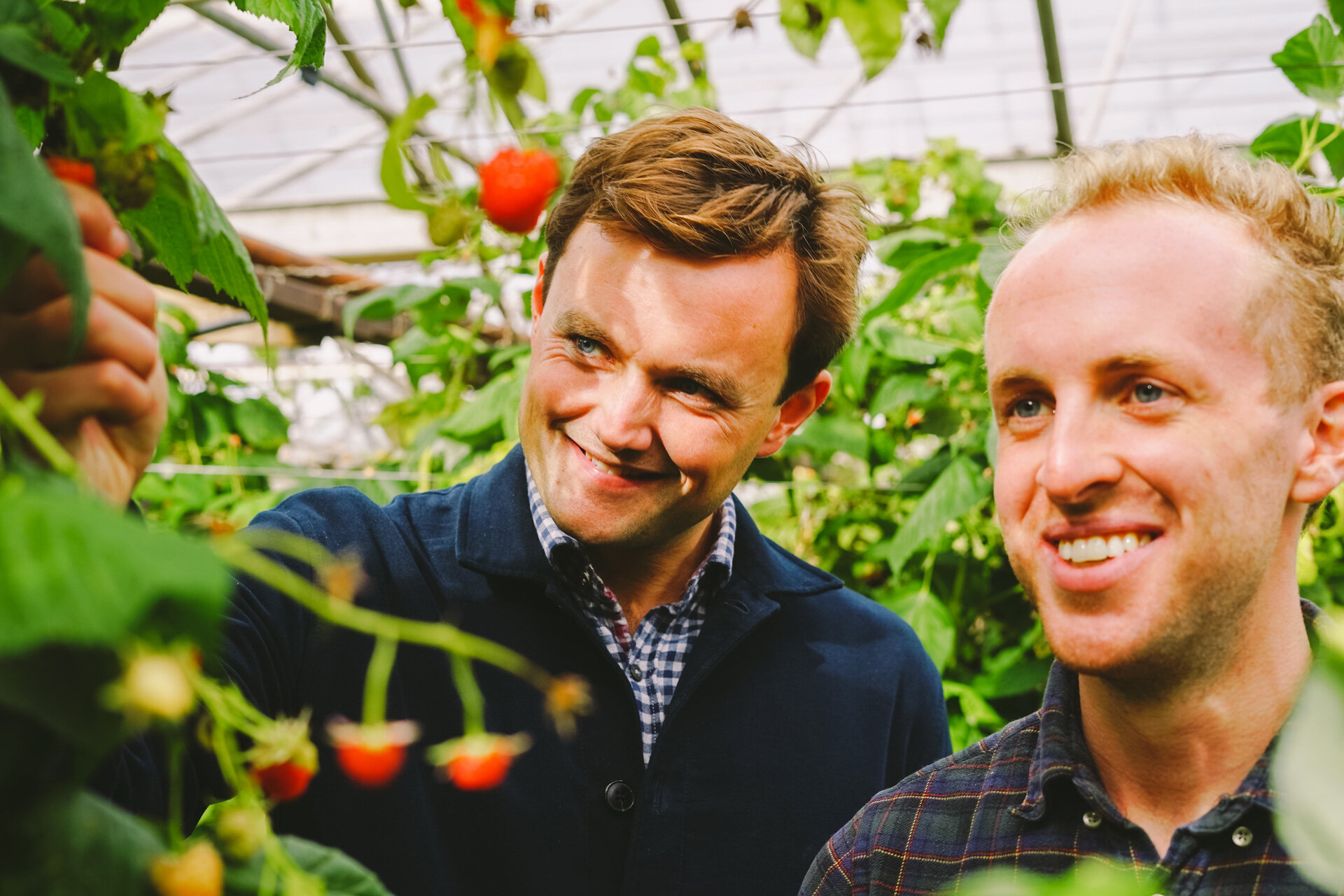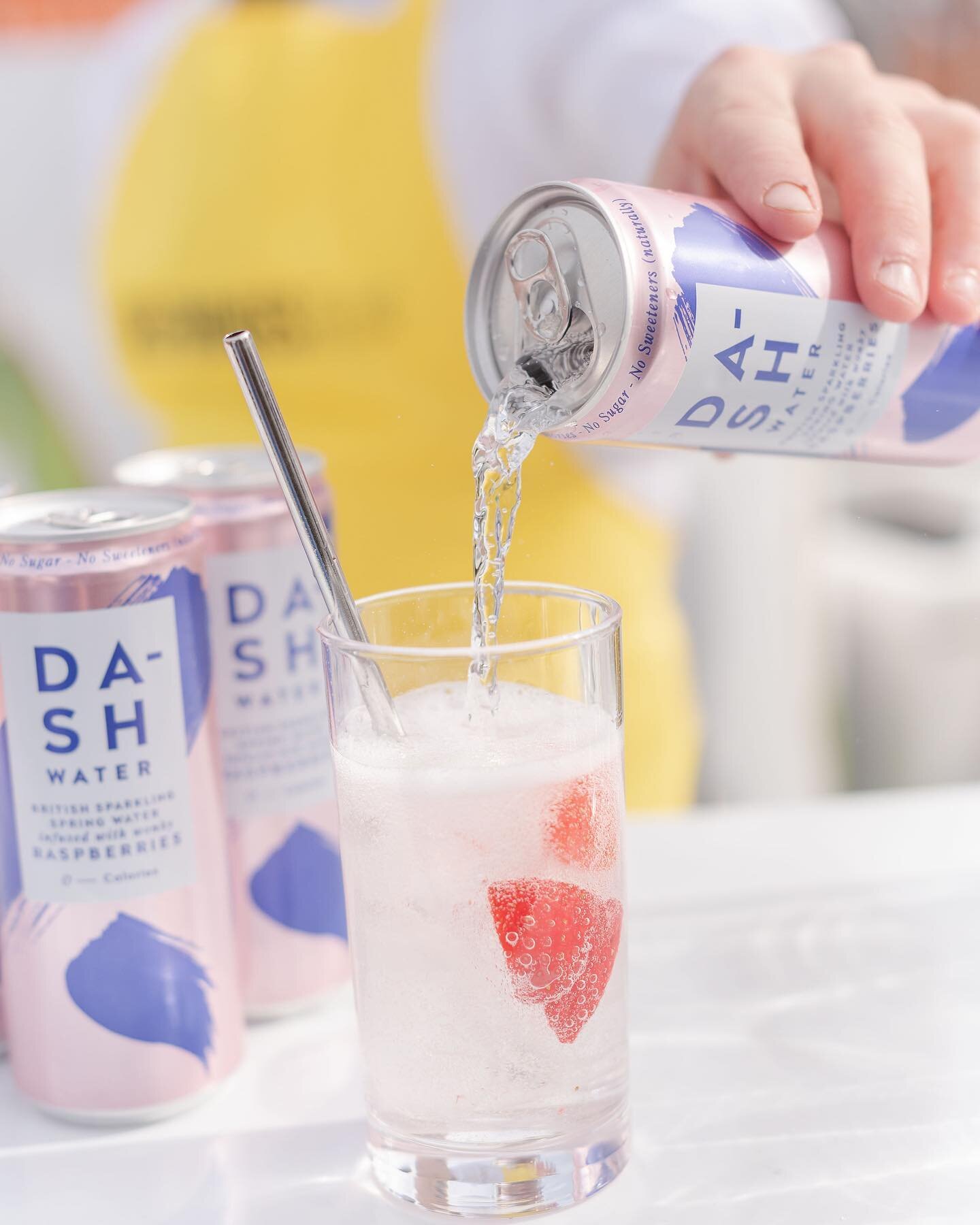‘Marketing is about doing less’: An interview with the co-founders of Dash Water
Jack Scott and Alex Wright, cofounders of Dash Water. Photo: Dash Water.
With one-third of all food grown wasted globally, several new and emerging food and drinks brands are making it their business to tackle the problem. Dash Water, launched in 2017, is a soft drinks brand that infuses its sparkling water with wonky fruit and veg that would have otherwise gone to waste. The company saved 150 tonnes of wonky fruit in 2020 and, on its current trajectory, will save 2500 tonnes by 2025. Strategy Director Ben Cooper chats to co-founders Alex Wright and Jack Scott about why ‘doing less’ is better for the brand and how a challenger mindset helps Dash compete with the industry Goliaths.
What was the opportunity you saw for Dash Water?
JS: Alex and I are both from farming backgrounds and saw first-hand a real issue with food waste. Our family farm in Shropshire, for example, had a contract with McCain's, the chip manufacturer. They wanted a particular sized potato to make their chips with, and at the end of the summer holidays, our family would spend a lot of time potato grading, and many of ours were considered too small to use. I always thought it was such a massive waste of time, energy and resources to grow food that we would then throw away. So, when Alex and I were looking to source the fruit to make our drinks, we thought it was a great opportunity to infuse our water with surplus produce. The other aspect is that we saw a massive gap in the UK market for a great tasting drink that didn’t have any sugar or sweetener. We started filling big vats with water, infusing it with fruit, cooling it down using a carbonator and trying it out on the public in London. And the reaction was amazing. People thought it was refreshing and something they would pay for.
Photo: Dash Water.
How are you positioning Dash to compete in the £15.7bn soft drinks category?
JS: The soft drinks sector is very competitive, with large corporations occupying much of the shelf space. We wanted to create a healthier alternative to the mainstream so Dash needed to sit alongside San Pellegrino or Diet Coke and really appeal to consumers in the same way. We looked at many brands that we love and different aspects of why we love them. We looked at the Fiji Water bottle and how it makes you feel when you pick it up out of the fridge or when it's sat on your desk. Or Fever-Tree, and how it’s created such a premium and iconic brand. We also looked at challengers such as BrewDog. So, we tried to pick out certain aspects from different brands to create something that looked fantastic and would really work on the shelf.
AW: We were one of the first brands to launch in the UK seltzer category three and a half years ago, and we had to educate consumers because when they tried our product for the first time, they often thought it was strange as it wasn’t the full-on flavour they were used to from a canned drink. It took about two years for consumer expectations to change and for them to understand it wasn’t sweet because there’s no sugar or sweetener. The key thing was that our seltzer category started to become more populated as well. And with other brands joining the market, it amplified the noise, and consumers started to get used to seltzer products and the flavour.
How important has distribution and finding the right distributors been?
JS: As a business, we’re very focused on distribution because, in the drinks world, much of the marketing can be done by the products on shelf. I think it’s something that often gets overlooked. We worked relentlessly for the first six to twelve weeks to get listed in some of London’s coolest spots, including Whole Foods, Planet Organics, Fortnum and Mason and Selfridges. It wasn’t straightforward because you’re trying to get through to the decision-maker, and even if you’ve got a bang-on product, they get a lot of people trying to sell them things, especially the nice independents in London. We couldn’t get into Whole Foods for months, and we’d tried everything. In the end, Alex camped outside their office in High Street Kensington so that we could get that all-important face time with the buyer.
We wanted the right people at the right time drinking our product to build that brand equity and put us in a good position as we grew.
Without the budgets of your larger competitors, where do you have to sacrifice and where do you really have to overcommit?
JS: We have two brand values that we live and die by. One is simplicity. Our product is just water, bubbles and wonky fruit. So everything we do as a marketing team, whether it's a social media campaign or working with a creative partner, we keep things really simple, so people understand what we do and why we exist.
“Marketing is about doing less but making sure that everything we do is fantastic.”
The other value is transparency. When we started Dash, we wanted to make an ingredients label deck that consumers could really understand. We talk about the real farms where the wonky fruit comes from and we’re transparent with how we make our products, treat people within the supply chain, and work as a team.
Dash Water partner with food waste charity Feedback to identify farms with surplus fruit and vegetables. Photo: Dash Water.
For me, marketing is about doing less but making sure that everything we do is fantastic. That’s been our approach. There have been opportunities that we’ve turned down. Retailers have been interested in creating co-branded products, but we’ve felt it could muddy the water and sacrifice some of our brand equity. As tempting as it is to increase business volume, it’s important that we hold on tight to our brand, especially as we have such a simple product.
Wonky fruit is an important part of your story. Tell us how that works and how that aspect of your narrative sits in Dash’s communications hierarchy?
AW: We partner with Feedback, the food waste charity, to help us find our farms. Feedback offers a great process called gleaning, which connects farmers with excess supply to people who want it. For example, we source our blackcurrants from Jo Hilditch, a fourth-generation farmer in Herefordshire. When farmers have contracts with large companies, they tend to overproduce to ensure they can fulfil the contract. Consequently, fruit is often just left on the bush to fall to the ground, which is a huge waste of resources. We buy the surplus fruit from farmers such as Jo and infuse it into our drinks.
JS: We believe that the way the product looks and the liquid inside is most important. First, the product has to look appealing, so consumers grab it off the shelf. And then it has to taste fantastic, so they’ll repurchase it. So we didn’t think that the wonky message should be upfront. We’re really proud of reducing food waste, but it’s a secondary layer in our communications. It’s a message that we think makes consumers more loyal to our brand. There are plenty of opportunities to talk about wonky fruit, but first and foremost, we’re a great tasting drink that hopefully makes our consumers feel good about themselves and gives them a little excitement in their day.
How has the health crisis impacted the business?
AW: 2020 was a rollercoaster. Britain leaving the EU meant a huge shortage of workers coming to the UK from Eastern Europe to pick fruits and vegetables. Effectively, because of the lack of workers, a huge quantity of food went to waste throughout 2020. Around a third of fruits and vegetables grown don’t end up on people's plates in a usual year. Last year, in particular, was crazy.
Covid then meant that 60% of our business went into hibernation mode overnight. Coffee shops, restaurants, pubs and bars all closed suddenly, and we quickly had to shape-shift and turbo-charge other parts of our business. As Dash is only three and a half years old, we’ve always been strong online, but Covid certainly catalysed our e-commerce and subscription service with people not being able to go to their usual stores.
In many ways, we were fortunate in 2020, our target was to infuse 145 tonnes of wonky fruit, and we surpassed that by 20%. If you told me that figure in mid-March, I would have bitten your arm off! The results have given us real confidence and belief for 2021 as we’ve still got so much headroom for growth. The UK soft drinks industry is a £15bn market, and this year we’ll produce 10 million cans, so we’ve got a long way to go.
What plans do you have for 2021?
AW: This year, we should save over 300 tonnes of surplus fruit and vegetables. By 2025, our ambition is to save 2500 tonnes. We’re using our brand as a platform to encourage other people to reduce food waste. Saving 2500 tonnes of food waste by 2025 in the grand scheme of things is not huge, but if we can inspire others to reduce food waste, we’ll have gone a long way to completing our mission.
Our retail partners also have sustainability targets. We have what we call a wonky joint business plan that we create with retailers. A key part of that plan is how much fruit and vegetable waste can we reduce per year, and we have certain metrics to hit along the way.
“We don’t want to be shipping products across the world. That’s a fascinating opportunity for us.”
It’s where having a challenger mindset and thinking differently really helps. We can’t compete with big multinational companies on some of the traditional targets such as turnover and margin, but we can show retailers and consumers that there is a better way of doing things.
The UK seltzer market is starting to mature, and the US market is already mature, so we see plenty of headroom in those markets and the rest of the world. We currently export to 20 markets, and this year we will produce internationally and in another market (outside the UK) for the first time. It’s hugely important to us that we try to localise our production. We want to use local wonky fruit and veg and local spring water. We don’t want to be shipping products across the world. That’s a fascinating opportunity for us. With any new market, again, the education piece does take a long time. To break consumer’s habits of having sugary and artificially filled soft drinks, you’ve got to be patient. Change doesn’t happen overnight. We’ve just got to show consumers a better way.



